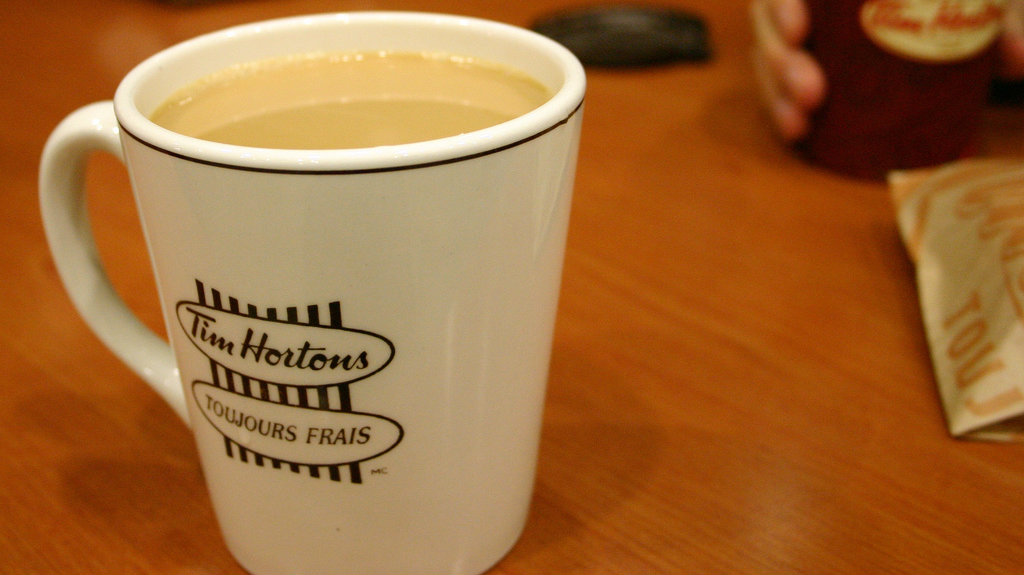It’s been the talk of the town of late. Tim Hortons is under fire because after its Ontario-based franchisees cut back on its employee benefits in order to deal with upped expenses from minimum wage hikes.
People have been pointing fingers at the franchisees, Ontario Premier Kathleen Wynne, and Tim Hortons’ parent company in Restaurant Brands International Inc. (TSX:QSR)(NYSE:QSR), but who’s most to blame and what’s going to happen after all the dust settles from the boycotts that have expanded beyond the confines of Ontario?
I think the blame deserves to be shared among all three culprits, as this situation has reached a boiling point and, in my opinion, has been blown completely out of proportion. While I’m sure management at Restaurant Brands has its hands full with its global expansion opportunities and the other two major brands under its portfolio, those in charge of the Tim Hortons brand have done an absolutely abysmal job of maintaining public relations in Canada. Perhaps this whole experience could serve as a PR lesson?
While the backlash from the recent debacle following Tim Hortons will likely be a drop in the bucket when considering its actual impact on financial results, I do believe the problems could have been minimized or even avoided altogether if management had communicated with its franchisees more effectively.
Proper communication makes all the difference.
Consider when Netflix Inc. (NASDAQ:NFLX) first hiked its prices back in the day. Subscribers dumped the service on a whim and shares plunged. Netflix shouldn’t have hiked rates, right? Not so fast. Consider the most recent Netflix price hike, which clearly outlined to subscribers that the increase would go towards funding the expanding menu of original programming. Subscribers weren’t too rattled by it, and many were even open to paying up for the promise of more new content.
While Netflix has likely gained substantial pricing power since its first hike, the point is that a sugar-coated delivery of bad news will be better digested by the folks on the receiving end.
Instead of hiking prices on franchisee supplies and quickly regretting the decision, management should’ve firmly hiked prices and explained that price hikes on select menu items would also be increased to offset some of the pains from imminent minimum wage hikes.
In addition, management should have better controlled the swift actions of its Ontario-based franchisees in order to prevent embarrassing press that reflected poorly on the Tim Hortons brand. While employee cuts aren’t unique to Tim Hortons, being swift to respond with employee benefit cuts definitely exacerbated the negative media, which seemed like it was aimed exclusively at Tim Hortons and not the many other businesses that were also guilty of the same (or worse) cuts at the expense of its employees.
Running a franchise also comes with risks. And if Restaurant Brands management had stricter guidelines to protect the integrity of its brands, it would have specified to franchisees that taking regional headwinds out on employees would be unacceptable. I’m sure the Great White North Franchisee Association (GWNFA) would become disgruntled again, but it’s a necessary requirement for the parent company to protect not only the employees, but also the reputation of the brand.
Bottom line
Tim Hortons is still arguably Canada’s top brand, and I’m confident that the backlash will be forgotten and forgiven in time. I do believe that management at Restaurant Brands will learn from its mistakes, and I’m certain such incidents will be better dealt with as the company continues to scoop up promising regional brands from across the fast food industry.
As Restaurant Brands’ first real acquisition, management is quickly discovering that proper franchisee control and brand protection are just as important as profits. While the Tim Hortons brand is by no means permanently tarnished, I still think management will make things right for employees at the expense of either the franchisees or the parent company. After all, it’s just a “drop in the bucket.”
I think the Tim Hortons debacle is overblown and in the grander scheme of things, is not an issue that investors should worry about. It’s a tough lesson for management, but I think the hiccup creates a buying opportunity for investors who want to get in early on one of the best growth stories on the market today.
Stay hungry. Stay Foolish.








